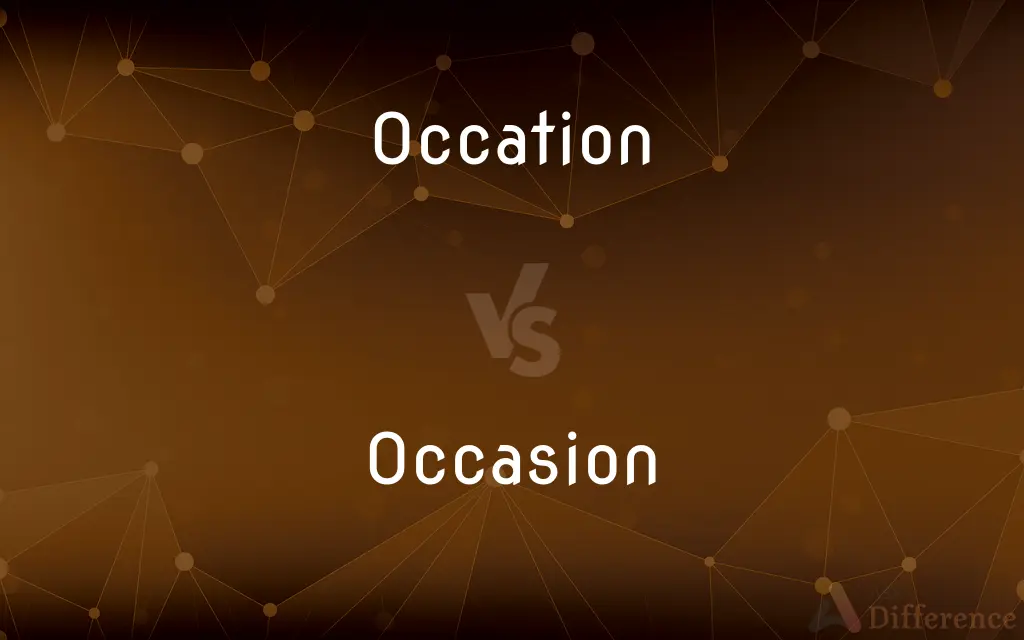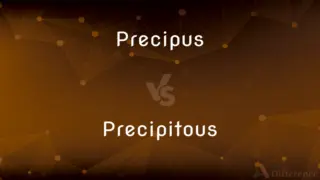Occation vs. Occasion — Which is Correct Spelling?
Edited by Tayyaba Rehman — By Fiza Rafique — Updated on April 2, 2024
"Occation" is a misspelling. The correct spelling is "occasion," referring to a particular event or a specific time when something happens.

Table of Contents
Which is correct: Occation or Occasion
How to spell Occasion?

Occation
Incorrect Spelling

Occasion
Correct Spelling
ADVERTISEMENT
Key Differences
Think of "occasion" as having a "casino" within it.
"Occasion" rhymes with "invasion," both having the "-sion" ending.
Recall: "On this occasion, all was CASual," emphasizing the CAS in occasion.
Double the "c" and single the "s" – "occasion."
Connect "occasion" to special moments; it's more than an "occation."
ADVERTISEMENT
How Do You Spell Occasion Correctly?
Incorrect: This calls for a celebration on such an important occation.
Correct: This calls for a celebration on such an important occasion.
Incorrect: We dressed up for the special occation.
Correct: We dressed up for the special occasion.
Incorrect: It's rare that we get such an occation to meet.
Correct: It's rare that we get such an occasion to meet.
Incorrect: On every occation, she outdoes herself with the decorations.
Correct: On every occasion, she outdoes herself with the decorations.
Incorrect: He bought a gift for the occation.
Correct: He bought a gift for the occasion.
Occasion Definitions
A particular event or time when something happens.
The awards ceremony was a grand occasion.
A specific instance of something happening.
On several occasions, he arrived late.
A reason or cause to do something.
There was no occasion for concern.
A special or formal event.
They dressed up for the occasion.
A particular event, or the time at which it takes place
On one occasion I stayed up until two in the morning
Reason; cause
It's the first time that I've had occasion to complain
Cause (something)
Something vital must have occasioned this visit
His death occasioned her much grief
An event or happening, or the time of an event or happening
On several occasions, we saw him riding a motorcycle.
A significant event, especially a large or important social gathering
The reception proved to be quite the occasion.
A favorable or appropriate time or juncture
Saw the layoff as an occasion to change careers.
A cause of or reason for something
A trade disagreement that furnished the occasion for war.
A need created by a particular circumstance
"He must buy what he has little occasion for" (Laurence Sterne).
Occasions(Archaic) Personal requirements or necessities.
To provide occasion for; cause
"The broadcast and its immediate aftermath occasioned a cascade of media commentary" (Lewis Sorley).
A favorable opportunity; a convenient or timely chance.
At this point, she seized the occasion to make her own observation.
The time when something happens.
On this occasion, I'm going to decline your offer, but next time I might agree.
An occurrence or state of affairs which causes some event or reaction; a motive or reason.
I had no occasion to feel offended, however.
Something which causes something else; a cause.
(obsolete) An occurrence or incident.
A particular happening; an instance or time when something occurred.
I could think of two separate occasions when she had deliberately lied to me.
A momentous occasion in the history of South Africa
Need; requirement, necessity.
I have no occasion for firearms.
A special event or function.
Having people round for dinner was always quite an occasion at our house.
A reason or excuse; a motive; a persuasion.
(transitive) To cause; to produce; to induce
It is seen that the mental changes are occasioned by a change of polarity
A falling out, happening, or coming to pass; hence, that which falls out or happens; occurrence; incident; event.
The unlooked-for incidents of family history, and its hidden excitements, and its arduous occasions.
A favorable opportunity; a convenient or timely chance; convenience.
Sin, taking occasion by the commandment, deceived me.
I'll take the occasion which he gives to bringHim to his death.
An occurrence or condition of affairs which brings with it some unlooked-for event; that which incidentally brings to pass an event, without being its efficient cause or sufficient reason; accidental or incidental cause.
Her beauty was the occasion of the war.
Need; exigency; requirement; necessity; as, I have no occasion for firearms.
After we have served ourselves and our own occasions.
When my occasions took me into France.
To give occasion to; to cause; to produce; to induce; as, to occasion anxiety.
If we inquire what it is that occasions men to make several combinations of simple ideas into distinct modes.
An event that occurs at a critical time;
At such junctures he always had an impulse to leave
It was needed only on special occasions
A vaguely specified social event;
The party was quite an affair
An occasion arranged to honor the president
A seemingly endless round of social functions
Reason;
There was no occasion for complaint
The time of a particular event;
On the occasion of his 60th birthday
An opportunity to do something;
There was never an occasion for her to demonstrate her skill
Give occasion to
A suitable time for something.
This is an occasion for celebration.
Occasion Meaning in a Sentence
They hosted a party to celebrate the special occasion.
On the occasion of his retirement, his colleagues threw a surprise party.
I bought a new dress for the formal occasion.
The festival is an occasion for joy and community gathering.
Every birthday is an occasion to celebrate life.
The anniversary provided a perfect occasion to revisit their vows.
The wedding was a beautiful occasion that everyone remembered.
This occasion calls for a toast to the newlyweds.
It's not every day that we have such a splendid occasion to gather.
I need to find a gift that's appropriate for the occasion.
He made a speech on the occasion of the company's 20th anniversary.
For the occasion, they decorated the entire house with flowers and lights.
The dinner was an intimate occasion, shared among close friends.
The award ceremony was a significant occasion for the young artist.
The picnic was a casual occasion, perfect for getting to know each other better.
She always knew how to make an occasion out of a simple dinner.
The occasion was marked by laughter, music, and dancing.
It was an occasion to remember, filled with heartwarming moments.
Each New Year's Eve is an occasion to set new goals.
They seized the occasion to announce their engagement.
On rare occasions, we get to see a blue moon.
She prepared a special meal for the occasion.
The occasion demanded a level of formality, so he wore his best suit.
On this occasion, we reflect on our achievements and challenges.
The school's founding day is an occasion of great pride for the community.
Common Curiosities
What is the pronunciation of occasion?
It's pronounced as /əˈkeɪʒən/.
What is the verb form of occasion?
The verb form is "occasion" as in "to occasion."
Which vowel is used before occasion?
The vowel "a" is used before the "-sion" in "occasion."
Why is it called occasion?
It's called "occasion" from Latin "occasio," meaning a juncture or opportunity.
What is the root word of occasion?
The root word is Latin "occasio."
Which conjunction is used with occasion?
There's no specific conjunction exclusively used with "occasion."
Is occasion a noun or adjective?
"Occasion" is primarily a noun.
Which preposition is used with occasion?
"On" is commonly used as in "on this occasion."
Is occasion a negative or positive word?
"Occasion" is neutral.
What is the plural form of occasion?
The plural form is "occasions."
Is occasion a collective noun?
No, "occasion" is not a collective noun.
What part of speech is occasion?
"Occasion" is primarily a noun but can also be a verb.
What is the singular form of occasion?
The singular form is "occasion."
Is occasion a vowel or consonant?
"Occasion" is a word containing both vowels and consonants.
How many syllables are in occasion?
There are three syllables in "occasion."
Is the occasion term a metaphor?
No, but it can be used in metaphorical expressions.
What is the first form of occasion?
For the verb, the first form is "occasion."
What is the second form of occasion?
For the verb, the second form is "occasioned."
What is the third form of occasion?
For the verb, the third form is "occasioned."
Is occasion an abstract noun?
Yes, "occasion" can be considered an abstract noun as it refers to an event or time, not a physical object.
Is occasion a countable noun?
Yes, "occasion" is countable. You can have one occasion or many occasions.
How do we divide occasion into syllables?
"Occasion" is divided as oc-ca-sion.
What is a stressed syllable in occasion?
The second syllable, "ca," is stressed in "occasion."
Which article is used with occasion?
Both "an" (before singular) and "the" can be used, depending on the context.
Is occasion an adverb?
No, "occasion" is not an adverb.
Is the word occasion imperative?
No, "occasion" is not an imperative verb form.
What is another term for occasion?
Another term for "occasion" is "event."
What is the opposite of occasion?
There isn't a direct opposite, but "non-event" can be a contrasting term.
Which determiner is used with occasion?
Common determiners include "this," "that," "every," and "each."
How is occasion used in a sentence?
Example: Every year, they host a party to mark the special occasion of their anniversary.
Share Your Discovery

Previous Comparison
Precipus vs. Precipitous
Next Comparison
Sweped vs. SweptAuthor Spotlight
Written by
Fiza RafiqueFiza Rafique is a skilled content writer at AskDifference.com, where she meticulously refines and enhances written pieces. Drawing from her vast editorial expertise, Fiza ensures clarity, accuracy, and precision in every article. Passionate about language, she continually seeks to elevate the quality of content for readers worldwide.
Edited by
Tayyaba RehmanTayyaba Rehman is a distinguished writer, currently serving as a primary contributor to askdifference.com. As a researcher in semantics and etymology, Tayyaba's passion for the complexity of languages and their distinctions has found a perfect home on the platform. Tayyaba delves into the intricacies of language, distinguishing between commonly confused words and phrases, thereby providing clarity for readers worldwide.


































